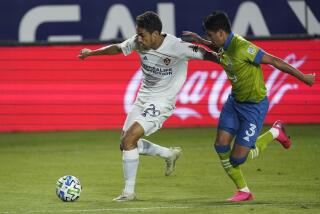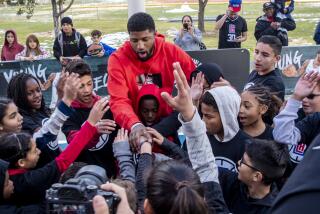They’re Making Their Marks : Local Players Try Germany as Alternate Route to NBA
- Share via
SAN DIEGO — In 1984, with graduation at Stanford only weeks away, Hans Wichary sensed his basketball career was over.
He had a feeling he was going to have to face a working world for which he was prepared, but that he didn’t want to enter.
Wichary still wanted to play basketball, harboring dreams of some day reaching the NBA. He had been The Times San Diego Section player of the year in 1980, leading the county in scoring at University of San Diego High School, and was productive but not spectacular at Stanford. He was passed over in the NBA draft.
A year later, Mike Whitmarsh faced a similar situation. His eligibility at the University of San Diego was exhausted, and he played pickup games while completing his course work.
Whitmarsh also was a 1980 All-County player, at Monte Vista, played two years at Grossmont College and then starred at USD, leading the Toreros to the 1984 NCAA tournament. He was a middle-round NBA draft choice by the Portland Trail Blazers that summer and close to fulfilling his dream. But after attending a number of rookie and summer camps, he was cut that fall.
Wichary and Whitmarsh are similar in another way. Both continued their basketball careers, and kept alive hopes of someday making it in the NBA, by playing professionally in West Germany.
“For a young guy coming out of college it’s really good money,” said Wichary, 25. “And it beats the hell out of going to work for some company for $22,000 a year having to work 40-hour weeks.”
This season will be Wichary’s fifth and, he says, his last. It will also be the first time he has played for the same team two years in a row. Last season, Wichary led BG 07 Ludwigsburg with a 9.3 rebounds a game and was second on the team in scoring with a 22-point average. That was eighth best in the league, called “1. Bundesliga.”
“I’ve done a heck of a lot better than my teams have done,” said Wichary, who has starred for teams in Cologne, Bremerhaven and Gottingen; the latter two were in the lower quarter of the 12-team league.
Whitmarsh, 26, is one of four former USD players playing in Europe. Anthony Reuss (Christian High) and Buzz Harnett play in the German league, and Mike Stockalper (Marian High) plays in Switzerland.
Whitmarsh averaged 21 points and 7 rebounds for DTV Charlottenburg (Berlin) last season, his second in the German league. He also said this season probably would be his last.
His first came from being in the right place at the right time. He was playing in a pickup game at USD in 1986, and Rick Shore, who was leaving a job as a Wichita State assistant to coach at Charlottenburg, saw him playing in a pickup game.
“During the summer a lot of European players play up at USD,” Whitmarsh said. “My coach (Shore) came to San Diego looking at Americans and came up to me one day and asked me if I wanted to go. I said ‘Sure.’ I’m glad I did it.”
The road Wichary took to Germany was almost as easy. He was finishing his course work at Stanford when he was contacted by a German agent about playing again--for a team in Cologne.
“I said, ‘Why not?’ ” Wichary said. “ ‘What kind of money and opportunity are we talking about?’ ”
The money was excellent, and the opportunity included travel and benefits.
Wichary and Whitmarsh say West German league pay for Americans (two per team are allowed) averages from $30,000 to $50,000. Both players are close to the top of that scale.
“That’s good money when you consider that overseas you are allowed to make up to $70,000 tax free a year,” Wichary said. “Plus, your expenses are very low. They pay for your apartment. They pay for your car. They pay for your flight ticket over there. So basically, the only thing you have to worry about is feeding yourself and clothing yourself. That’s a pretty easy thing to do.”
The transition is not as easy. Whitmarsh misses the Southern California life style.
“When I first got there (West Germany) I was scared,” he said. “I was put into this vacant apartment with just a bed. I sat down and asked myself, ‘What am I doing here?’ Then I got sick and they said, ‘If I get sick now, wait until winter.’ I eventually got comfortable, and I felt obligated to my teammates. I have a lot of friends there now. The German people are very friendly.”
Wichary, with several more years experience in Europe, understands.
“It’s a completely different life style over there,” Wichary said. “The first few years you are happy with the charm of Europe. You’re interested in everything. Learning the language is definitely important. That is something I’ve taken the time to do. But adjusting to the way of life over there at times is difficult and at times is a lot of fun.”
More difficult than fun, he said, is getting used to referees in the German league.
“The refereeing over there is atrocious by American standards,” Wichary said. “I go and play in my summer leagues here, and the players are complaining about the refs here, and I’m in heaven because these guys are calling it the way they see it and have at least a little bit of basketball upstairs.”
Marco Baldi, a German who is a former teammate of Wichary’s (and not to be confused with the Italian center who played for St. John’s several years ago), added some insight during a recent visit to San Diego.
“Basketball developed very fast in Germany,” said Baldi, who played guard for Ludwigsburg last season. “But the education of the referees didn’t. . . . Everybody knows but it’s tough to change, because who wants to be a ref? In Germany, it’s not a big honor to be a ref.”
Wichary and Whitmarsh have endured it all--leaving behind friends and family, extreme changes in lifestyle, exasperating officiating--for one reason: a chance to develop and perhaps get another shot at the NBA.
Wichary’s opportunity may come because of his ability to shoot from the outside. Not that many 6-9 players can consistently bury the three-point shot. Wichary won the three-point shooting contest at the post-season German All-Star game last season. He can also play a physical game inside.
For Whitmarsh to make the NBA, he’ll have to overcome the stigma that hurt him with the Trailblazers. Whitmarsh is a “ ‘tweener”--too small for forward, but without the ball-handling or quickness to play guard.
Jack Ramsay, the Portland coach when Whitmarsh was in camp, gave him the facts.
“Ramsay thought I was a good player,” Whitmarsh said. “But he said I was kind of in between. He said I should have no problem getting over to Europe.”
He had none. His problem now is getting back. What may be his advantage is his all-around game and leadership.
“There are hundreds of guys who can go out and score 20 points,” Whitmarsh said. “But it is hard to find a complete player who can score, pass, rebound and basically lead the team.”
Said Baldi: “Mike was very important player for Berlin. They can win the championship this year. Last year, the team wasn’t that tough, and he was one of the personalities.”
Baldi uses the word personality to mean star, something for which the NBA will have more room by the 1989-90 season, when four new franchises will have entered the league within two years.
“I think there are a lot of opportunities now especially because of the expansion,” Wichary said.
“I think if I can have a good year over in Europe this year, and I can find the right situation, the right type of system, the right coach and if my timing is good . . . I’m basically saying, if I’m lucky, I can get into the NBA. Look at Kurt Rambis. He was over in Greece playing ball, and he got into the right situation in Los Angeles.”
Said Whitmarsh: “I thought about the NBA a lot last year. I’m debating if I’m going to try out again. Maybe after this season I’ll think about it again. I think I’m a better player now than I was out of college.”
If there still is no room in the NBA, Whitmarsh said he will begin work in commercial real estate, Wichary in finance. But not yet. The problem, Whitmarsh said, is that NBA expansion is hardly a secret.
“If I get in the right situation, anything can happen,” he said. “But there are hundreds of players in Germany, Italy and Spain thinking the same thing.”
More to Read
Go beyond the scoreboard
Get the latest on L.A.'s teams in the daily Sports Report newsletter.
You may occasionally receive promotional content from the Los Angeles Times.










